Commentary
Preparation Is Paramount
Finance & Development, December 2014, Vol. 51, No. 4
![]() Conversation with the minister
Conversation with the minister
Rwanda’s efforts to prevent Ebola from spreading into the country show that a multisectoral approach beyond health is needed

One of the greatest challenges to progress in global health is the narrow view that investing solely in health systems is a panacea for managing health threats.
Rather, it is necessary to strengthen all the sectors that affect social determinants of health and governance—including finance, transportation, security, and communication—to ensure a collaborative and effective response to such threats.
As an example, look at how my country, Rwanda, is managing efforts to prevent the spread of the Ebola virus, which has devastated many countries in west Africa.
While it seeks to prevent Ebola from occurring in Rwanda, the health care system should not be distracted from its persistent fight against premature deaths due to maternal and childhood ailments, HIV/AIDS, tuberculosis, malaria, and others. It is critical that it adapt and adjust across all sectors to mitigate such an acute and unanticipated threat.
Ability to govern
The threat tests not only the responsiveness of the health care system, but also the country’s ability to govern. Rwanda’s response has required mechanisms for multisectoral and collaborative policymaking, as well as a shared mind-set of making the most of every available resource.
For instance, funds are needed to manage the prevention of an outbreak of Ebola—such as to quickly outfit all public hospitals with isolation units and to train health care professionals who can be on the front lines if needed—and the Ministry of Health needs the financial sector to support its decisions. Also, given the potential transmission of the virus from people entering the country, we have had to rely on the transportation sector and the immigration office to implement our foreign travel policies. Furthermore, the security sector has had to enforce emergency procedures—such as 24-hour countrywide readiness to contain any potential Ebola case.
To harmonize these decisions and to keep all stakeholders—especially the general population—informed, it has also been critical to involve the communications sector.
This multisectoral approach was not patched together in the face of this particular crisis. Rather, it was created carefully and collaboratively over time.
For example, leaders of Rwanda are accustomed to meeting in policy “clusters,” including the Social Cluster, which is cochaired by the Ministries of Health and Education. Rather than operating in silos with narrow vantage points, we meet monthly as a group to discuss the bigger picture and build consensus around how we can extract the most value from each use of the limited, but growing, resources of the country. It has put the onus on officials of different ministries to be collaborative problem solvers rather than competitors for government funds.
Costly endeavor
While these habits have benefited policymakers greatly as we navigate this current threat, managing the prevention of Ebola has also been extraordinarily costly—not only in money but in time. Every hour that we work to prevent Ebola is one we are unable to devote to other development objectives, such as improving our health care service delivery. Moreover, these efforts have placed a sizable financial burden on our economy. The investment required to fight this acute threat in the near term may delay the planned construction of a new health center or hospital or road or school. While this has been a costly adjustment, the cost of inaction—or partial or poorly planned action—is far greater.
The threat of Ebola has challenged our health care system to rise to a new level. It has also shown how we can do even more with the limited resources that we have—time and money—both within the health care system and across the sectors that have been involved with the response.
We should constantly strive to improve collective efforts to protect and promote the health and well-being of our people—including, of course, bolstering investment in strengthening the health sector. After all, without health professionals, equipment, and infrastructure, we could not manage any health threat. But the Ebola crisis has also taught us that to improve our response to the next challenge that may await us, we must also strengthen our country’s ability to govern collaboratively. This includes investing not only in the provision of emergency health services, but more broadly in all sectors that affect the well-being of the people—who are our greatest resource. ■


